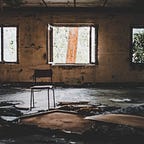Three Poems by Wilda Morris
Workshop Words
She asks: what are your favorite words
and I think cerulean which sounds serene
as blue sky or calm sea but won’t work to describe
the leaves of a maple in any season
or the brown eyes of the one I love.
The sound, she says, the sound of your favorites,
so I say Chicago, Chicago for the opera,
the symphony, the Sinfonietta, the saxophonist on the corner
playing for coins on Saturday morning, Lollapalooza, Jazz Fest,
Gospel Fest, the sound of hundreds of feet emerging
from a METRA train and the mingling of languages
in the Loop. But she says, not the sounds of the city,
the sound of the name and I say, Oshkosh, of course.
That’s only two, she says. I asked for ten, and I say trickle? tickle?
tinkle? No! twinkle, because no matter how it’s used, it brings to mind
dad’s eyes when he told a story, when he teased, when he helped
someone. Anyone. Yes, I say, twinkle.
I used to like the words knee, neck, hip, till arthritis struck them from my list.
And what other words do you like, she asks. Rhubarb, I say,
because it sounds a little rude, like its tart taste, though it has
no barbs. I smell the sauce bubbling in the pot, the pie
about to emerge from the oven. My mouth waters when I hear
that word, and grandfather’s ghost materializes
from the rhubarb patch, arms full of stalks.
And bittersweet, with its promise of paradox, its picture of flowers
and life all a muddle. Yes, I muse, I like the word bittersweet,
and the word muddle, too.
More words, she says, but cut out the malarkey. Just list them.
Mississippi, I mumble. Aardvark, existential. I stop and ponder:
justice, I say at last, and peace. Those are my very favorite —
but where can I find them?
Originally published in Journal of Modern Poetry, in 2013.
I Am Not Writing about Daffodils. I Am Trying
to Make Them Bloom Again
I am not writing about the daffodils that bloom in my garden
every spring, daffodils bright as Florrie’s smile. Daffodils
the color of the dress Florrie wore home from the hospital
when she was the golden-haired infant full of possibilities
we though would crawl and talk soon.
I am not writing about the daffodils in the Easter photographs
taken after we knew the sound of bells made Florrie smile,
not the church bells ringing out a hymn of resurrection,
though those bells would make her giggle and wave
palsied arms, but just the small set of bells I tapped
with a wooden mallet, making music just for her.
No, I not writing about the daffodils, their trumpet-like
coronas announcing spring when the doctor announced
a new diagnosis, saying Florrie would fade like a flower,
her nervous system decay like fallen petals, that she
would suffer like a cut stem. I cannot write
about the daffodils I laid across her small casket.
No, I cannot, will not. I am not writing about daffodils.
Originally published in Voices on the Wind, February 2020.
Searching for My Dutch Ancestor
I survey the paintings of Vermeer
looking for my eighth great-grandmother
to show up on a canvas.
She may be the milkmaid
or the girl in the yellow satin jacket
reading a letter by the window.
Or maybe she is the laughing girl
flirting with the officer in the red uniform
and black hat, just a few weeks before
she meets the sailor who will become my ancestor.
Then I decide she might be the woman
in the blue bed jacket, pregnant, I think —
though art experts deny it. She must be
reading a letter from her husband away at sea,
hoping he will return before the birth of their child,
my seventh great-grandmother.
More likely, though, I’m descended
from the laundry maid on the little street
in Delft. Once clothes are washed
and hung to dry, she takes up the broom,
her work never done. No doubt
she will delight in the chance
to sail the Atlantic to New Amsterdam
with the husky young sailor from Antwerp.
Originally published in The Basil O’Flaherty, March 2016.
